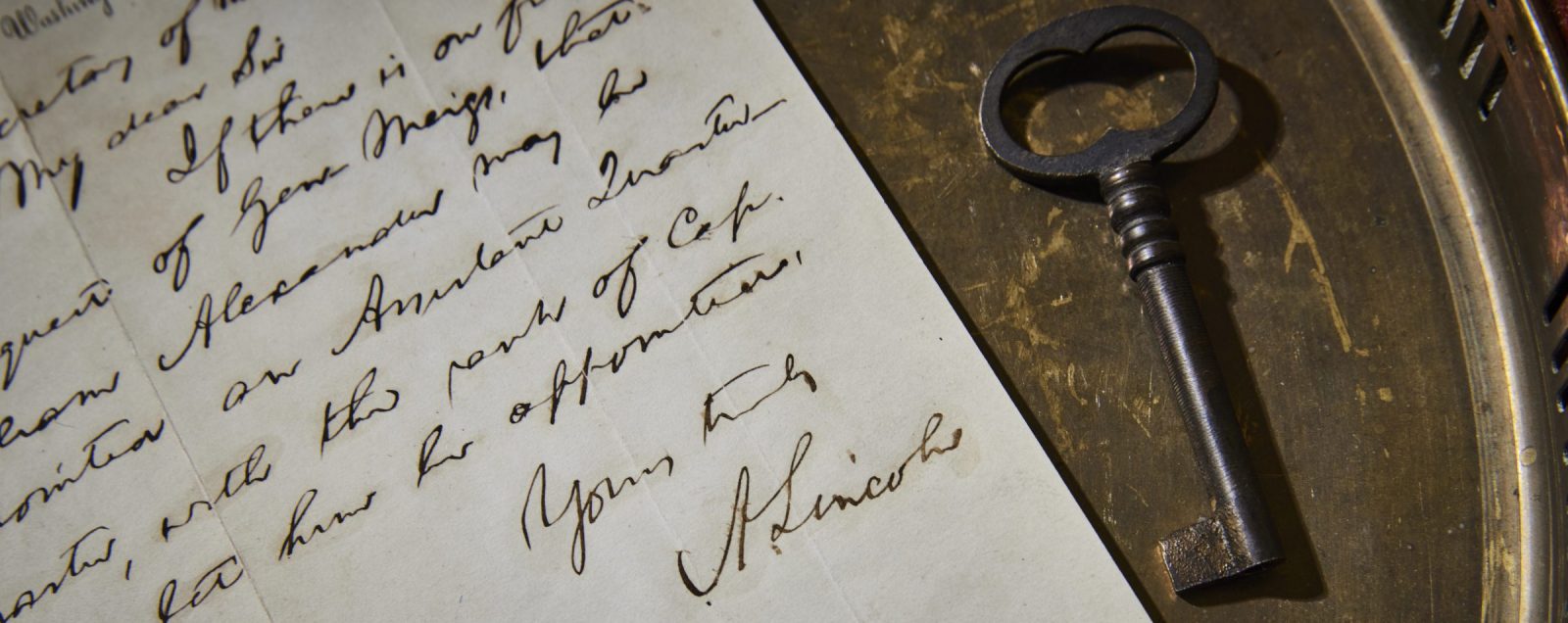President Abraham Lincoln Writes Secretary of War Edwin M. Stanton, Urging Stanton to Help Gen. Montgomery Meigs Bolster the Quartermaster’s Department





An uncommon letter showing Lincoln intervening at the highest level, written the same month as he promoted U.S. Grant to command his armies
- Currency:
- USD
- GBP
- JPY
- EUR
- CNY
“If there is on file a request of Gen. Meigs, that William Alexander may be appointed an Assistant Quarter-Master, with the rank of Captain, let him be appointed.”
There is no record of the appointment having been made, with speculation being that Lincoln possibly sent the appointment to Stanton to die...
“If there is on file a request of Gen. Meigs, that William Alexander may be appointed an Assistant Quarter-Master, with the rank of Captain, let him be appointed.”
There is no record of the appointment having been made, with speculation being that Lincoln possibly sent the appointment to Stanton to die there
Lincoln had the rare quality of not taking opposition personally. During the Civil War, he was vilified more than any other public figure in American history, yet saw the issues as so great that they transcended any personal aspect. He bore no resentments because, as he said, he “never thought it paid.” He appointed men to high office because he perceived that they would be useful to the war effort. When Gen. George B. McClellan was insufferably rude to him, he was willing to suffer the personal indignity if only McClellan would win. His most important civilian appointment shows this management principal in operation. Edwin Stanton had met Lincoln before the war when they had served as co-counsel in a famous lawsuit involving the McCormick reaper. Stanton, who had a reputation for being stern, imperious, hot-tempered and controlling, had snubbed him, and then ridiculed him publicly as a gorilla and an imbecile. Lincoln also saw him as honest, dedicated and extremely competent. Carrying no grudges, he appointed Stanton to be Secretary of War, and it was a brilliant choice. The two men came to respect and even like each other as they worked together daily to achieve victory.
Lincoln even used Stanton to deflect criticism from himself. Lincoln was inundated with requests for military positions, requests in which he had little if any interest. But these requests often came from members of his administration, from Union generals, or other notables, and the President could not decline them without angering his friends, colleagues, or other supporters of the Union cause. He shoveled these requests to Stanton, with his endorsement. But Stanton would only approve those requests he deemed meritorious.

Montgomery C. Meigs was a career United States Army officer, civil engineer, and construction engineer. At the start of the Civil War, Lincoln appointed Meigs quartermaster general, a crucial post that was perfectly suited to his organizational and management talents. Before the war, Meigs played a key role in the extension and dome of the U.S. Capitol. After the war, he oversaw much of the design and monument construction at Arlington National Cemetery.
Meigs had requested that Lincoln make an appointment in his department, and the President wrote this letter to accommodate him. Autograph letter signed, on Executive Mansion letterhead, Washington, March 21, 1864, to “Hon. Secretary of War.” Lincoln writes, “My dear Sir, If there is on file a request of Gen. Meigs, that William Alexander may be appointed an Assistant Quarter-Master, with the rank of Captain, let him be appointed. Yours truly A. Lincoln.”
There is no record of the appointment having been made, with speculation being that Lincoln sent the appointment to Stanton to die there. An interesting letter, associating the President, Secretary of War, and Quartermaster General, and taking place just eleven days after Grant assumed the role that led to Union victory.


Frame, Display, Preserve
Each frame is custom constructed, using only proper museum archival materials. This includes:The finest frames, tailored to match the document you have chosen. These can period style, antiqued, gilded, wood, etc. Fabric mats, including silk and satin, as well as museum mat board with hand painted bevels. Attachment of the document to the matting to ensure its protection. This "hinging" is done according to archival standards. Protective "glass," or Tru Vue Optium Acrylic glazing, which is shatter resistant, 99% UV protective, and anti-reflective. You benefit from our decades of experience in designing and creating beautiful, compelling, and protective framed historical documents.
Learn more about our Framing Services













































































































